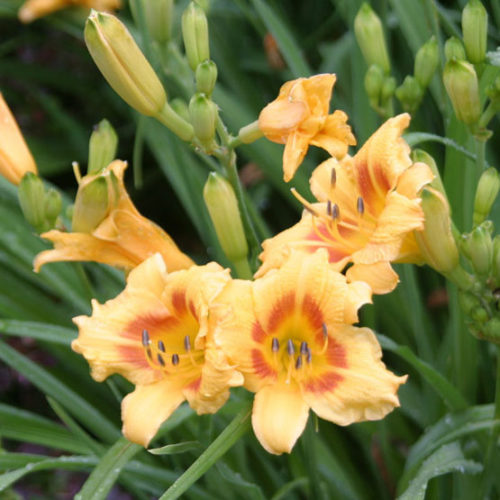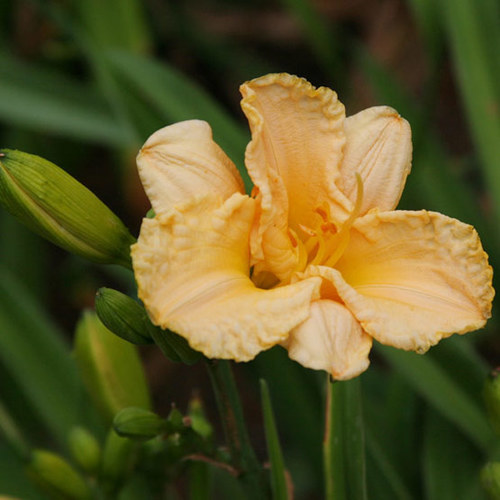
Daylilies are classic, extremely popular garden plants. They feature long, arching, strappy leaves and long stems of generally 6-petaled flowers, though double flowers are popular as well. Each flower lasts only one day, hence the plant’s common name. Daylilies come in a wide range of colors, from cream and cheery yellow to peach, orange, fiery red, deep burgundy, pink, and purple. Some have contrasting throats and “eye-zones.” Daylilies are ideal for a mixed herbaceous perennial border.
Noteworthy CharacteristicsThis cultivar has apricot-yellow flowers with deep orange eye-zones and grows to 24 inches tall. It has a nocturnal extended blooming habit; it opens in the late afternoon and closes the following morning or early afternoon, for at least 16 hours. Each flower lasts for only one day. It is a rebloomer, so it will bloom more than once in a season.
CareDaylilies are basically sun lovers. They bloom admirably in six hours of sun and will make do with less, but in the North, the more sun they get, the better. In the South, though, they appreciate protection at midday and do best under a high canopy of light shade. While daylilies will grow in ordinary garden soil and are not fussy about pH, they perform magnificently in soils that have been generously amended with organic matter--compost, rotted leaves, or well-aged manure. Moisture is the other key to growing really spectacular daylilies. Although their plump storage roots keep them going in times of drought and guarantee survival, an abundance of water makes all the difference to the quality and quantity of the flowers. Try to provide at least an inch of water a week in the North, more in the South. Mulching plants with shredded leaves or other light organic matter goes a long way toward ensuring moisture retention.
PropagationSow seed in containers in spring or autumn. Divide in spring or autumn.
Problems Daylilies are strong plants and relatively pest and disease resistant. Some minor damage from sucking insects like aphids and thrips. Slugs and snails may damage young leaves. Rust is possible.
- Genus : Hemerocallis
- Plant Height : 1 to 3 feet
- Plant Width : 1 to 3 feet
- Zones : 10, 3, 4, 5, 6, 7, 8, 9
- Uses : Containers, Ground Covers
- Tolerance : Drought Tolerant
- Bloom Time : Early Summer, Late Spring, Spring, Summer
- Light : Full Sun
- Moisture : Medium Moisture
- Maintenance : Moderate
- Growth Rate : Moderate
- Plant Type : Perennials
- Plant Seasonal Interest : Spring Interest
- Flower Color : Yellow
Plant Characteristics are only available to Fine Gardening members
Sign up for a free trial and get instant access to our complete plant guide as well as our entire collection of articles and videos.



























